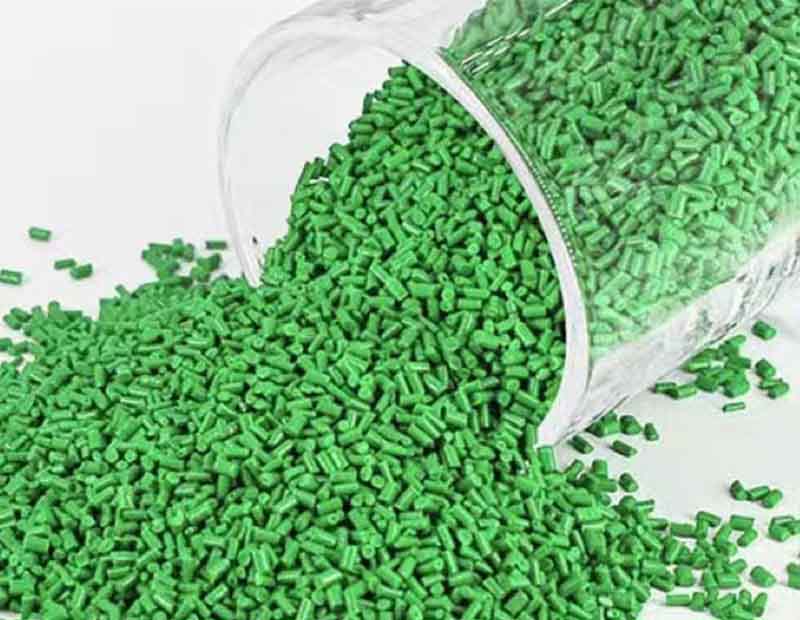Polyphenylsulfone (PPSU) is a High-performance thermoplastic belonging to the sulfone polymer family. This amorphous polymer is characterized by its transparent amber appearance and exceptional combination of thermal stability, chemical resistance, and mechanical strength. PPSU exhibits a glass transition temperature (Tg) of 220°C and can maintain structural integrity at continuous service temperatures up to 180°C, outperforming many other engineering plastics.
Key chemical structure: PPSU's molecular backbone contains phenyl groups and sulfone linkages, providing exceptional thermal stability and chemical resistance. The material's repeating unit consists of diphenyl sulfone groups connected by ether linkages, creating a rigid yet tough polymer matrix.

Material Characteristics with Technical Data
1. Thermal Properties: PPSU demonstrates outstanding heat resistance with a Vicat softening temperature of 207°C (ASTM D1525) and a heat deflection temperature (HDT) of 204°C at 1.82 MPa. Its thermal conductivity measures approximately 0.29 W/m·K, while the coefficient of thermal expansion ranges from 5.5 × 10⁻⁵ to 5.7 × 10⁻⁵ K⁻¹.
2. Mechanical Performance: With a tensile strength of 70-75 MPa (ISO 527) and flexural modulus of 2.3-2.5 GPa, PPSU maintains excellent dimensional stability. It shows impact strength of 80-85 kJ/m² (ISO 179) even at low temperatures (-40°C), demonstrating remarkable toughness.
3. Chemical Resistance: PPSU exhibits resistance to most acids (except concentrated sulfuric and nitric acids), bases, and organic solvents. It maintains stability across a pH range of 2-13 and shows particularly good resistance to hydrolysis, with less than 0.2% water absorption (ISO 62) after 24 hours immersion.
4. Electrical Properties: The material's dielectric strength reaches 16 kV/mm (IEC 60243), with a volume resistivity > 10¹⁶ Ω·cm and dissipation factor of 0.003 at 1 MHz, making it suitable for electrical applications.
Primary Application Scenarios
Medical Devices: PPSU's autoclavability (up to 1000 cycles at 134°C) and biocompatibility (ISO 10993 compliant) make it ideal for surgical instruments, dental equipment, and reusable medical components. Its transparency allows for visual inspection of fluid pathways in devices like hemodialysis filters.
Aerospace Components: Aircraft interior panels, seat components, and cabin lighting fixtures utilize PPSU due to its FAR 25.853 flammability compliance and ability to withstand repeated sterilization cycles required in aviation hygiene protocols.
Food Processing Equipment: PPSU meets FDA 21 CFR 177.2440 and EU 10/2011 food contact regulations, making it suitable for coffee machine parts, milk pump components, and other food processing applications where steam sterilization at 130°C is required.
Water Treatment Systems: Membrane housings and filtration components benefit from PPSU's chlorine resistance (>500,000 ppm-hours) and ability to withstand pressures up to 10 bar at elevated temperatures.
Electrical Connectors: The material's Comparative Tracking Index (CTI) of 225V and stable dielectric properties make it suitable for high-voltage connectors and circuit breaker components.
Maintenance and Care Guidelines
Cleaning Procedures: For optimal maintenance:
Use mild detergents with pH between 5-9 for routine cleaning
For disinfection, alcohol solutions (<70% concentration) or hydrogen peroxide (<3%) are recommended
Avoid chlorine-based cleaners which may cause surface crazing after prolonged exposure
Sterilization Methods: PPSU components can undergo:
Steam autoclaving at 134°C for 18 minutes (typical medical cycle)
Gamma radiation up to 50 kGy with minimal property degradation
Ethylene oxide (EtO) sterilization with proper aeration cycles
Storage Conditions: To prevent property degradation:
Store in UV-protected environments below 40°C
Maintain relative humidity below 60% to prevent moisture absorption
Keep away from strong oxidizing agents and concentrated acids
Mechanical Maintenance: For moving parts:
Apply silicone-based lubricants (viscosity 50-100 cSt) for bearings or sliding components
Inspect for stress whitening, which indicates strain levels exceeding 1.5%
Replace components showing yellowing (ΔYI > 15) from prolonged thermal exposure
Note: PPSU's properties remain stable through approximately 500-700 autoclave cycles before mechanical properties begin to decline. Regular inspection of critical components should be performed after 300 sterilization cycles in medical applications.
Processing Considerations
When manufacturing PPSU components:
Recommended melt temperature: 340-380°C
Mold temperature should be maintained at 120-160°C
Drying requirements: 4-6 hours at 150°C to achieve moisture content below 0.02%
Injection pressure: 80-120 MPa for optimal filling






